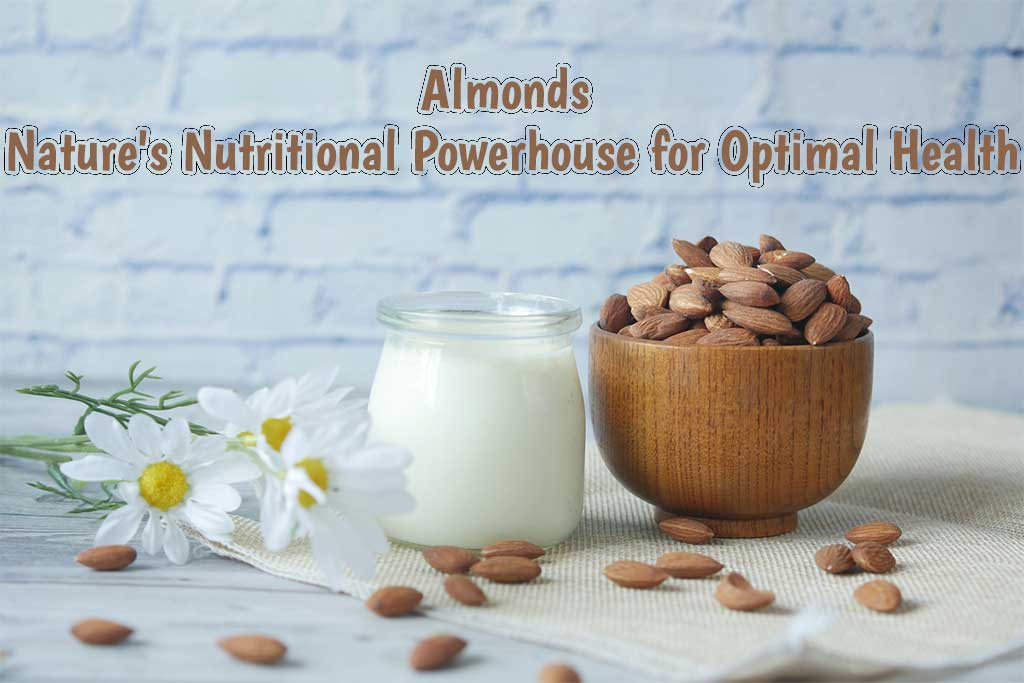Almonds Nature’s Nutritional Powerhouse for Optimal Health

Almonds, hailed as one of nature’s most nutritious superfoods, have garnered immense popularity in recent years. With their delicate crunch and rich flavor, these nuts offer far more than just a delightful snack. In this comprehensive guide, we will explore the numerous health benefits of almonds, practical ways to incorporate them into your daily diet, the wide range of products based on almonds, and the impressive nutritional profile of these powerhouse nuts.
Description of Almonds:

Almonds are oval-shaped nuts with a hard outer shell and a tender, cream-colored kernel inside. They have a distinct mildly sweet and nutty flavor. Almonds are widely cultivated around the world and are known for their versatility in both sweet and savory dishes. Whether eaten raw, roasted, or incorporated into various culinary creations, almonds are a delicious and satisfying addition to any diet.
10 Remarkable Health Benefits of Almonds:
- Heart Health: Almonds are rich in heart-healthy monounsaturated fats, which can help reduce bad cholesterol levels and lower the risk of heart disease.
- Weight Management: Despite their relatively high calorie content, almonds are packed with dietary fiber and protein, promoting feelings of fullness and aiding in weight management.
- Brain Function: Almonds contain nutrients like vitamin E, magnesium, and folate, which contribute to brain health, memory retention, and cognitive function.
- Bone Strength: Almonds provide essential minerals like calcium, phosphorus, and magnesium, supporting strong and healthy bones.
- Blood Sugar Control: The low glycemic index of almonds, coupled with their fiber and healthy fats, helps regulate blood sugar levels and improve insulin sensitivity.
- Digestive Health: Almonds are an excellent source of dietary fiber, aiding in proper digestion and preventing constipation.
- Skin Radiance: The vitamin E and antioxidants present in almonds contribute to healthy skin by combating oxidative stress and promoting a youthful glow.
- Eye Health: Almonds contain vitamin E, which may help protect against age-related macular degeneration and maintain overall eye health.
- Energy Boost: The combination of healthy fats, protein, and fiber in almonds provides sustained energy levels and helps combat fatigue.
- Antioxidant Powerhouse: Almonds are rich in antioxidants, which help neutralize harmful free radicals and reduce the risk of chronic diseases.
Incorporating Almonds into Your Daily Diet:
- Snack on a handful of almonds between meals for a satisfying and nutrient-rich option.
- Add sliced or crushed almonds to your breakfast cereal or oatmeal for added crunch and nutrition.
- Use almond butter as a spread on toast, fruits, or as a dip for vegetables.
- Include chopped almonds in your salads, stir-fries, or roasted vegetable dishes for added texture and flavor.
- Blend almond milk into smoothies or use it as a dairy-free alternative in baking and cooking.
Almond-Based Products and Culinary Delights:

The versatility of almonds extends beyond their raw or roasted form. Almonds are used as a primary ingredient in various products, including almond milk, almond flour, almond oil, almond butter, and almond extract. These products offer unique flavors and textures, making them popular choices for vegan and gluten-free recipes, as well as for those seeking nutritious alternatives.
Nutritional Value of Almonds per 100 grams:
– Calories: 576 kcal
– Carbohydrates: 21.69 grams
– Fats: 49.42 grams
– Protein: 21.22 grams
– Vitamin E: 25.63 mg
– Calcium: 264 mg
– Iron: 3.71 mg
– Fiber: 12.5 grams

Harnessing the Health Benefits of Almonds
Incorporating almonds into your daily diet can significantly contribute to your overall health and well-being. These mighty nuts offer an array of nutritional benefits, ranging from heart health and weight management to brain function and skin radiance. With their versatility and rich flavor, almonds can be enjoyed in various forms and recipes, allowing you to unlock their remarkable potential for optimal health.
FAQ Section:
Q1: Are almonds suitable for individuals with nut allergies?
A1: Almonds are tree nuts and can trigger allergies in some individuals. If you have a nut allergy, it is crucial to avoid almonds and any almond-based products.
Q2: Can almonds help with weight loss?
A2: Yes, almonds can aid in weight loss due to their fiber and protein content, which promote satiety and help control appetite when consumed in moderation.
Q3: Can almonds be consumed during pregnancy?
A3: Yes, almonds are a great source of nutrients for pregnant women, including folate, healthy fats, and calcium. However, it’s important to consult with a healthcare professional for personalized advice.
Q4: Can almond milk be used as a substitute for dairy milk?
A4: Absolutely! Almond milk is a popular dairy milk alternative for vegans, individuals with lactose intolerance, or those seeking a lighter option. It can be used in cooking, baking, or enjoyed on its own.
Q5: Are almonds a good source of protein for vegetarians or vegans?
A5: Yes, almonds are an excellent plant-based source of protein. Including almonds in a vegetarian or vegan diet can help meet protein requirements.
Incorporating almonds into your lifestyle can yield a multitude of health benefits and add a delightful twist to your meals. So, go ahead and embrace the nutritional power of almonds for a healthier and more vibrant life.

